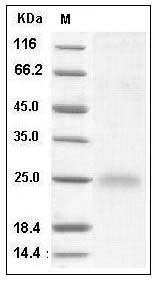-
Product Name
Human Cystatin 7 / CST7 recombinant protein
- Documents
-
Description
The cystatin superfamily members are important natural cysteine protease inhibitors present in a wide variety of organisms and are divided into three classes. Cystatin F, also known as leukocystatin and CMAP (Cystatin-like Metastasis-Associated Protein), is a type 2 cystatin and its expression is limited to hematopoietic cells, with the highest expression levels being observed in monocytes, dendritic cells, and certain types of T-cells. Furthermore, cystatin F mRNA becomes up-regulated during dendritic cell maturation, and thus suggests a specific role of cystatin F in immune regulation. Cystatin F is produced as a dimer, an inactive cathepsin inhibitor which is activated by chemical reduction. In addition, Cystatin F and its homologues have been observed expressing in various human cancer cell lines established from malignant tumors, and thus indicates a new diagnosis and prevention approach of certain human carcinomas metastasis.
-
Protein name
Cystatin-F
-
Protein short names
CST7; MGC151424; CMAP; CYSTATIN F; RP23-156P22.1; MGC151426
-
Uniprot ID
O76096
-
Gene Name
CST7
-
Source/Expression Host
Human Cells
-
Expression Plasmid/cDNA
The mature form of the human Cystatin F (NP_003641.3) (Met 1-His 145) with five amino acids (DDDDK) at the C-terminus was expressed and purified.
-
Protein Species
Human
-
Molecular weight
The recombinant human Cystatin F consists of 132 amino acids and predicts a molecular mass of 15.2 kDa. As a result of glycosylation, the apparent molecular mass of rhCystatin F is approximately 25 kDa in SDS-PAGE.
-
Purity
> 95 % as determined by SDS-PAGE
-
Validations

Human Cystatin 7 / CST7 Protein SDS-PAGE
Related Products / Services
Please note: All products are "FOR RESEARCH USE ONLY AND ARE NOT INTENDED FOR DIAGNOSTIC OR THERAPEUTIC USE"
